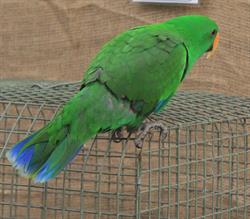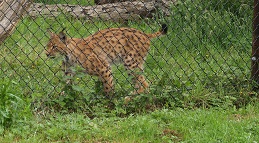Gain the skills and knowledge to work with captive animals
Zookeepers are an essential part of the captive animal industry.
They are responsible for meeting the daily care, handling and overall wellbeing needs of a variety of faunal species.
Zookeepers must be multiskilled and highly educated to perform their roles well. They must understand components of animal biology, psychology, taxonomy, behaviour and more.
They must be able to recognise and respond to signs of ill-health, discomfort, abnormal behaviours, hunger, stress and more.
They must be able to develop relationships with the animals they care for. Work with the animals, build their trust and ensure that the animals in their care are as healthy and happy as possible.
Today, zoos and captive animal care facilities contribute as an essential source of conservation, education and continued social awareness.
They are sanctuaries for animals. Safehouses. Establishments which require the passion, dedication and enthusiasm of highly diligent, capable and caring people.
Are you ready to take the next steps in your journey towards caring for captive animals?
Study Zoo Keeping with ACS - lay the foundation
for lifelong learning, network with the industry and discover the
diverse range of opportunities to work with wildlife!
COURSE STRUCTURE AND CONTENT
Course Duration: 600 hours.
Start Date: Start at any time - study at a pace that suits you, and with full tutor support for the duration of your studies.
Modules: The course comprises 3 Core Modules, and 3 Elective Modules. Students are to complete 6 modules in total.
THE CORE MODULES
Click on the module titles below for more information on each.
Students are to complete the following Core Modules:
Animal Health Care VAG100
 Learn
to identify and describe common signs of ill health and diseases in
animals, and the appropriate types of treatment for these. This 12
lesson module looks at the broader aspects of animal welfare and control
as well as codes of practices and the services provided by
veterinarians. The module includes preventative health care, as well as
considering routine health treatments (such as de-sexing and
castration). It is concluded with a lesson on animal rehabilitation and
recovery.
Learn
to identify and describe common signs of ill health and diseases in
animals, and the appropriate types of treatment for these. This 12
lesson module looks at the broader aspects of animal welfare and control
as well as codes of practices and the services provided by
veterinarians. The module includes preventative health care, as well as
considering routine health treatments (such as de-sexing and
castration). It is concluded with a lesson on animal rehabilitation and
recovery.
Zoo Keeping BEN208
This
9 lesson module is looks at the keeping of animals in captivity, in
zoos, safari parks and the like. Students will learn about how zoos
have developed and how their designs have changed. Context is provided
by considering what the functions of zoos are, the environmental
requirements of captive animals balanced against the requirements to
provide habitat and enclosure designs which also enable effective human
viewing of specimens. The module includes lessons which look at animal
behaviours, interactions with zoo keepers, the health and nutrition
requirements of captive animals as well as the health and safety
principles which need to be followed. The module concludes with a PBL
project on Environmental Enrichment, where students will be able to
consider and apply what they have learned through their studies.
Animal Behaviour BAG203
 This 8 lesson module teaches students to understand the motivations of
behaviour in animals. It focuses on the behaviour of animals and how
the knowledge of this can be applied to handling, training and managing
animals. Students will study the influences of genetics, perceptions,
and the environment on animals’ behaviour, understanding also the
elements of learned and unlearned behaviour.
This 8 lesson module teaches students to understand the motivations of
behaviour in animals. It focuses on the behaviour of animals and how
the knowledge of this can be applied to handling, training and managing
animals. Students will study the influences of genetics, perceptions,
and the environment on animals’ behaviour, understanding also the
elements of learned and unlearned behaviour.
THE ELECTIVE MODULES
Click on the module titles below for more information on each.
Students are to select 3 modules from the following: -
Marine Studies I
Ornithology
There are certain things that provide an
indication to zookeepers that an animal’s welfare has been compromised.
Some of these indicators are subtle and may only be detected by
observations made over time. Others may be more obvious. A skilled
zookeeper will always be observing the animal populations in their care,
and noticing when such indicators appear. These indicators include:
-
Reduced longevity
-
Reduced ability to grow or breed
-
Body damage (injury)
-
Immunosuppression
-
Physiological attempts to cope
-
Behavioural attempts to cope
-
Increased susceptibility to disease
-
Behavioural pathology (e.g., stereotypies, apathy, self-mutilation).
Observing behavioural indicators of animal
welfare is the preferred method used in zoos as it is non-invasive.
There are four major behavioural indicators that can indicate the
wellbeing of a particular animal.

Social interactions, problem solving and observing how the animal learns can provide indication of their state of mind
-
Developing abnormal behaviours can show that the animals’ biological processes cannot function properly in their environment.
-
Changes in the individual’s nature can be seen if the animal is
unable to display behaviours that would come naturally in the wild
-
Observing behaviours in conjunction with ethogram information
and observations of other individuals of the same species can also be
indicators of an animal’s well being.
Detection of a potential problem may not always warrant action
immediately; but suspect animals should be watched more closely and a
veterinary professional should be consulted when they persist.
Why Study with ACS?
Design your own learning pathway.
Study at your own pace, from anywhere, at any time.
Receive prompt, expert support from our team of committed and friendly tutors.
Your learning is our priority. We are flexible and adaptable to meet your educational needs!
Enrolling is easy - just go to the top of this page and select your study method and payment option.
If you have any questions about studying with ACS, or want to know more about any of our courses, get in touch with our specialist tutors today. They will be happy to answer your questions and look at different study options to fit in with your goals.